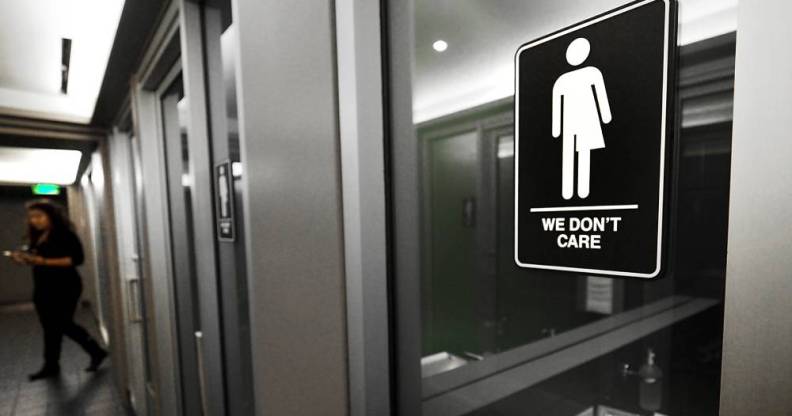Five years after abhorrent anti-trans bathroom bill, city passes sweeping LGBT+ protections

After the ‘bathroom bill’ was brought in, gender-neutral signs were posted in public restrooms in 2016 in Durham, North Carolina. (Sara D Davis/Getty Images)
Five years after Charlotte, North Carolina tried to protect its LGBT+ residents but instead sparked an anti-trans “bathroom bill”, it has finally passed the LGBT+ non-discrimination laws that initiated the backlash.
The city council of Charlotte unanimously passed a non-discrimination law on Monday (9 August) that will protect LGBT+ residents in many areas of public life.
The measure adds sexual orientation, gender identity, gender expression, familial status, veteran status, pregnancy and natural hairstyle to the list of characteristics protected by anti-discrimination laws in Charlotte. The laws apply to public accommodation, hiring a car, and workplaces.
The new measures will all be in place from 1 October, except those covering workplaces which will come in at the beginning of 2022.
Daniel Valdez, president of Charlotte Pride, told NBC News that he hopes other towns will follow in Charlotte’s example.
“With the new protections passed tonight, Charlotte finally joins its peer cities in protecting LGBTQ residents and visitors to our city,” he said in a statement Monday.
“Tonight’s vote is a strong sign that Charlotte has finally turned a page in our decades-long fight for equality in our city.”
Pro-LGBT+ ordinance led to ‘bathroom bill’ backlash
In 2016, Charlotte passed a similar measure that explicitly protected trans people’s right to use the bathroom that aligns with their gender identity as opposed to their sex assigned at birth.
A right-wing backlash then ensued, resulting in the North Carolina General Assembly holding a special session to a few weeks later to pass House Bill 2 (HB 2), known as the “bathroom bill”, which blocked Charlotte’s measure, barred trans people from public bathrooms, and prevented other towns in North Carolina from passing similar pro-trans legislation.
National outrage followed, with boycotts and tensions around trans people’s access to public spaces expected to cost the state billions in lost business. HB 2 was repealed in 2017, but its replacement, HB 142, still means that Charlotte’s new measure cannot explicitly cover public bathrooms.
This is because only general assembly-level lawmakers can legislate on bathrooms and public changing facilities. Equality campaigners are now calling for HB 142 to be repealed.
Trans-inclusive bathrooms proven to be safe
The California-based Williams Institute on Sexual Orientation and Gender Identity Law and Public Policy studied the impact of a 2016 Massachusetts anti-discrimination law, Senate Bill 2407, which included trans people.
The bill banned discrimination against trans people in housing, employment, and public accommodations, and was opposed by critics who claimed that trans-inclusive spaces would allow people with “evil intentions” to “prey on the vulnerable”.
Anti-trans groups across the US, and in other countries such as the UK, have used similar arguments that people could abuse the system of self-identification and therefore endanger women and girls.
The study, which was published in the peer-reviewed journal Sexuality Research and Social Policy in 2018, found these fears to be baseless.
Researchers analysed data for a period before and after the 2016 bill passed, comparing criminal incident reports related to assault, sex crimes and voyeurism in public restrooms, locker rooms and dressing rooms between locations in Massachusetts that enforced trans-inclusive policies versus those that did not.
Findings indicated that reports decreased after the bill was passed. The study was published in the peer-reviewed journal Sexuality Research and Social Policy in July and concluded that “fears of increased safety and privacy violations as a result of nondiscrimination laws are not empirically grounded”.

